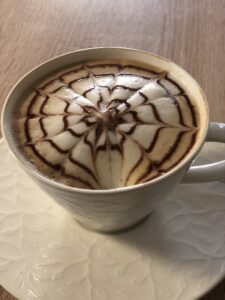13 Jun Coffee and Longevity: The Role of Bowel Regularity
By Dr. Claudia Welch June 12, 2025
⸻
 Most of the attention coffee gets is for its ability to energize. But a new study, presented at the American Society for Nutrition’s annual meeting and reported in The New York Times on June 12, 2025, suggests coffee might also play a role in helping us age well. Researchers followed more than 47,000 women for decades and found that those who drank the most caffeine—mostly from coffee—were more likely to reach their 70s in good mental and physical health, free from chronic diseases.
Most of the attention coffee gets is for its ability to energize. But a new study, presented at the American Society for Nutrition’s annual meeting and reported in The New York Times on June 12, 2025, suggests coffee might also play a role in helping us age well. Researchers followed more than 47,000 women for decades and found that those who drank the most caffeine—mostly from coffee—were more likely to reach their 70s in good mental and physical health, free from chronic diseases.
Women in their 70s who had consumed the most caffeine between the ages of 45 and 70 had a 13% greater chance of meeting the study’s criteria for “healthy aging” than those who drank the least. Decaf coffee and tea, though also caffeinated to some degree, didn’t show the same benefit. Nor did cola—whose caffeine didn’t help and may have harmed. So caffeine itself does not appear to increase longevity. The benefits seem more likely tied to coffee’s complex chemistry.
But in the various articles over the last decade or so about coffee’s impact on longevity, I haven’t seen much discussion of what seems like an obvious question:
Could the reason—or a reason—coffee is good for longevity be that it makes people poop?
⸻
The Bowel Movement Hypothesis
Constipation is no small thing. As we age, our bowels tend to slow down. Hormonal changes, medications, sedentary habits, and digestive sluggishness can all conspire to make elimination irregular or incomplete. And when elimination is compromised, everything gets backed up—literally and metabolically. Waste lingers longer in the colon, hormones like estrogen may recirculate rather than exit, inflammation can increase, and the microbiome may tilt in an unfriendly direction.
 So anything that reliably helps us go may do more for our health than we give it credit for.
So anything that reliably helps us go may do more for our health than we give it credit for.
Coffee, it turns out, is pretty consistent in this department. About 30% of people report that it sends them to the bathroom soon after drinking. And this effect isn’t just anecdotal. Studies show that coffee stimulates colonic motility, meaning the colon starts moving things along. It can trigger activity in the distal colon—the part closest to the rectum—within minutes of consumption.
Even decaf does this, though not as strongly. That’s important. It tells us the effect isn’t only due to caffeine. Compounds like chlorogenic acids and N-alkanoyl-5-hydroxytryptamides—found only in coffee—may stimulate digestion and colonic contractions. But caffeinated coffee does it better. And in the study reported in The New York Times, only caffeinated coffee correlated with healthy aging. Decaf didn’t—we could hypothesize that this is possibly because it doesn’t stimulate bowel movements as strongly.
That raises a question: What if the stronger laxative effect of caffeinated coffee is one of the main reasons it’s linked to healthier aging? It’s not proven—or studied to my knowledge—but seems plausible, and has largely been overlooked.
From an Ayurvedic point of view, this isn’t a surprising hypothesis. Ayurveda places high importance on daily, complete elimination as a key factor for health and longevity…
When digestion is balanced and waste is regularly removed, the body is better able to build tissues, clear toxins, and maintain clarity of mind. In contrast, when elimination is blocked, so are the channels through which prāṇa, vitality, and intelligence flow.
Another possible factor is coffee’s bitter taste—something rarely found in the modern diet, especially in the West. Bitters are known to stimulate digestion, bile flow, and elimination, and may contribute to coffee’s effect. But that alone doesn’t explain the longevity link —since decaf more or less tastes the same, yet doesn’t carry the same benefit.
Taste might not be the whole story either. How coffee is prepared seems to matter, too. Some studies suggest that brewing coffee through a paper filter helps remove certain compounds—like diterpenes—that have been associated with raising LDL cholesterol and increasing mortality risk. Espresso, French press, and boiled Turkish coffee—despite being strained—are considered unfiltered by this standard, and may introduce problematic factors into an otherwise helpful habit.
⸻
 But What If Coffee Doesn’t Suit You?
But What If Coffee Doesn’t Suit You?
This is where Ayurveda might raise its hand gently and ask: Who are we talking about?
From an Ayurvedic perspective, not all constitutions can handle coffee. People with more vāta in their makeup—those who tend toward anxiety, light sleep, dryness, and sensitivity—often find that coffee unsettles their nervous system. It can make them jittery or wired, or just amplify the unease already under the surface. That’s unfortunate, because increased vāta is also associated with increased constipation. So while coffee’s laxative effect might be helpful, its nervous system effects may cancel out or outweigh the benefit.
For people with more pitta, coffee can irritate the gut and contribute to gastritis or ulcers.
People with more kapha—those who are naturally calm, grounded, and slow to react—can often drink coffee without trouble. In fact, they may benefit from its stimulating qualities.
And that leads to another question worth asking:
Could it be that the people in the studies who drink the most coffee are also the ones whose constitutions can handle it—people who are already more resilient, more kapha-dominant—and therefore more likely to age well?
If so, then perhaps coffee isn’t the whole story. Maybe it’s the kind of person who can tolerate coffee who’s also predisposed to live longer, or at least better. We don’t have data to confirm that, but it’s a question worth sitting with.
⸻
For the Rest of Us: Gentle Support for Elimination
If coffee makes us anxious, sleep-deprived, irritable, or contributes to gastric distress, forcing ourselves to drink it for the sake of longevity may be counterproductive. But that doesn’t mean we have to give up on regularity.
Ayurveda has long offered gentle, constitutionally appropriate approaches to healthy elimination. As with anything health-related, it’s good to check with your practitioner to see if these are appropriate for you—but a couple of remedies are good for most people:
- Triphala at night: Take ½ teaspoon of triphala powder either on the tongue or stirred into a quarter to half a cup of boiling water. Let it cool and drink it an hour before bed. Ayurveda teaches it is good to taste your herbs but if you dislike the taste and don’t feel like getting used to it, or are traveling and powder is inconvenient, take 2 triphala tablets (e.g., from Banyan Botanicals) with a full cup of water. Triphala supports elimination without overstimulating the system. It is said not to be habit forming, but rather works to support the overall health of the colon.
- Psyllium husks (satisabgol): Stir 1 teaspoon into a full cup of water one hour before before bed. Make sure to drink the full cup—psyllium only works properly when taken with enough water. It bulks the stool and gently helps things along.
These approaches can help keep elimination steady without over-activating a sensitive constitution.
⸻
Conclusion
Coffee is a pretty effective plumber. Maybe its longevity benefits come not only from the complex components it adds to our daily intake, but what it helps us let go of—early, daily, and without too much strain.
For those who can tolerate it, a morning cup might do more than wake us up. And for those who can’t, well… we have other ways of keeping things moving.
References:


